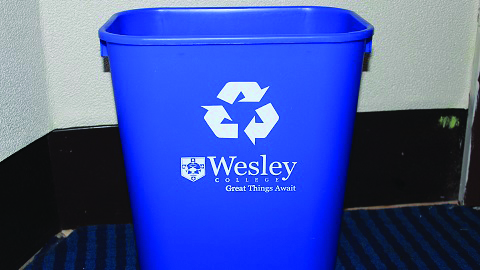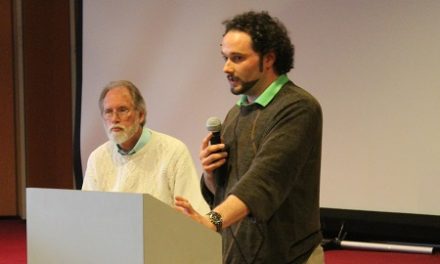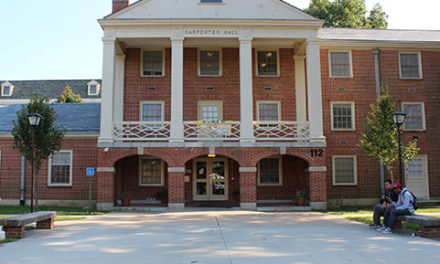
Sustainable Wesley is responsible for implementing recycling bins around campus | Kristen Griffith/The Whetstone
by Emily Temple, The Whetstone
Last spring, the organization Sustainable Wesley brought about 1,200 recycling bins to Wesley campus. This change can save Wesley as much as $12,300 annually, said senior Brook Thompson.
“We pay about the same amount for recycling every month, it’s a flat rate,†Thompson said. “With our trash, it’s per ton. If we can decrease trash, the amount out of Wesley’s pocket will decrease.â€
Recycling costs Wesley between $2,000 and $3,000 every month, regardless of how much materials are being recycled.
Before recycling was implemented, trash disposal cost between $2,000 and $5,000 every month, with a waste production as high as 30 tons per month. Last semester, the cost ranged from about $500 to a little less than $3,000, with at most half the waste production as before.
Both the environmental and economic benefits are the payoff of over a year’s work by students, faculty and staff.
“The program was started by Dr. Kent Hurst, who applied for and got the grant,†said Dr. Stephanie Stotts, an Environmental Studies professor. “There was some recycling going on at that point, but it was just in a few offices with a few recycling bins.â€
The grant money from the Delaware Department of Natural Resources and Environmental Control (DNREC) came in late spring as Hurst was leaving Wesley. Stotts picked up where Hurst left off, and was joined by Sustainable Wesley’s founder, Betty Lee.
Lee started the environmental organization when her move into Wesley gave her culture shock.
“Recycling has always been a thing for me as far as I can remember,†Lee said. “I asked my R.A. where the recycling bins were, and he told me there were none.
“I was like, well, you’re gonna get some.â€
Stotts and Lee collaborated with Rick Richardson, Fran Riddle, Shavonna Martinez, and all of Wesley’s maintenance staff, who coordinated a schedule for clearing bins, said Kenny Ciccoli, another member of Sustainable Wesley.
There was an adjustment period for students who were recycling for the first time.
“At first, students were just using it as another trash can,†Thompson said.
As a Resident Assistant, Lee had to explain to some of her residents that the bins weren’t just extra trash cans. Despite this initial confusion, the situation is improving.
“This year we gave students recycling information during orientation, so they’re starting the year prepared,†Lee said.
The impact on Wesley College, both environmentally and economically, has been considerable, but changes can still be made.
Stotts said she wants to see more outdoor recycling bins.
“On the North side of campus, we have a ton of outdoor recycling bins,†she said. “On the south side of campus, there are none.â€
Stotts believes the results of last semester’s recycling, and the estimated savings, will be an incentive for adding more bins.
“If recycling bins are saving so much money, it may be worth pouring additional concrete pads, or doing whatever it takes to get recycling bins on that side of campus, because we may see even further savings.â€
Thompson said students have asked her if bins could be placed in specific areas around campus.
“If students voice their opinions about locations that need recycling bins, we should definitely be able to put something there,†she said.
“I’ve seen unused bins in a closet on campus, and if they could be used, I think that would be great.â€
Lee and Stotts are also advocating composting, the use of food waste as a fertilizer, as another way Wesley could become more sustainable.
“We put all our trash into those big black bins in the cafeteria, but we could make a composting area as well,†Lee said.
Stotts has plans for how composted materials could be used in the future.
“We’re starting up a campus or community garden through my living learning community, and again in the spring with the Frontiers of Science course,†she said.
“I think it would go a long way to making us a sustainable college if we could use compost that we’ve made from our cafeteria to grow in our garden, or use in landscaping around campus rather than buying fertilizer.â€
While the program has only been in place for a little over a semester, its organizers are enthusiastic about the results.
“I’m excited and hopeful that we’re looking at ways to become more sustainable, and I hope that this momentum can continue,†Stotts said.
“There are still a lot of places on campus that we can take steps that are not only good for the environment, but can actually save us money. When we can make those two goals align, that is a win-win for everyone.â€
Thompson presented her findings at a symposium at the University of Delaware. Soon she plans on presenting her information to Wesley’s Board of Trustees to show the impact the program has had.
“I’m really excited to publicize the benefits of this recycling program,†Thompson said.
She hopes students take this as an example of how students can have a positive impact on their community.
“Sustainable Wesley, as a student-run organization, made a difference on campus. I think that’s my favorite part of this.â€



